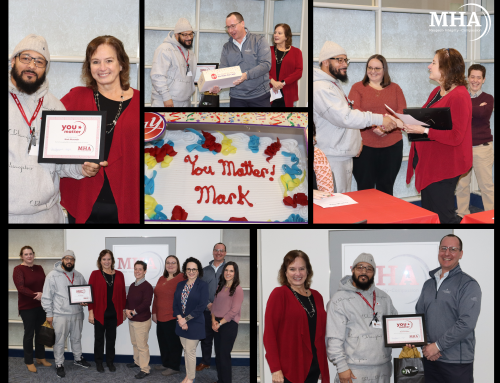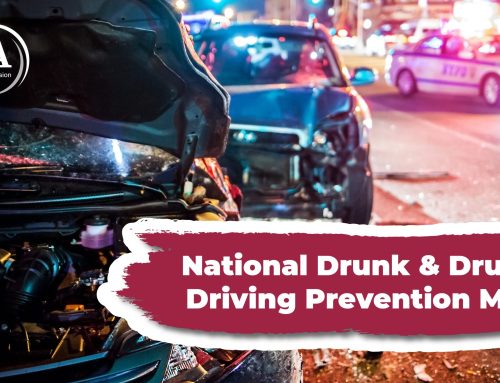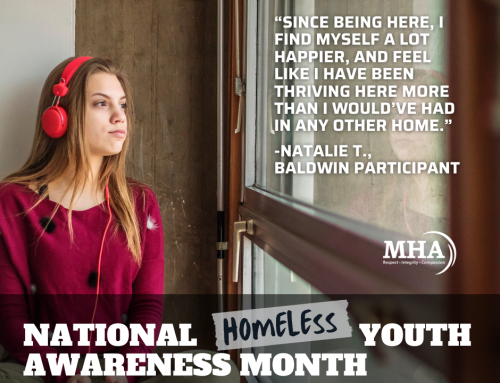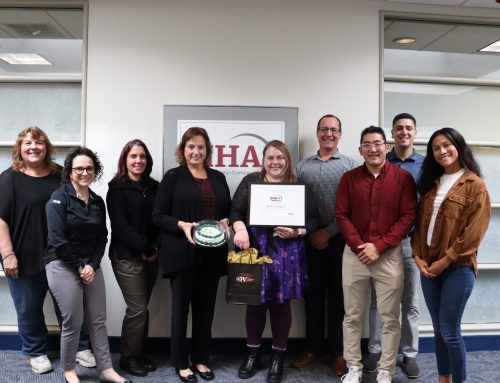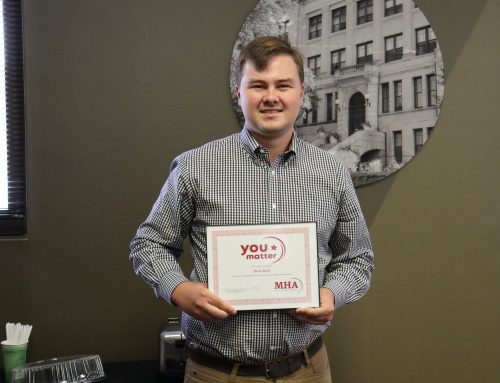 “When people come to respite, I see them cry twice: when they come in and when they leave, and never in between,” says Karyn Reigner, Program Coordinator for Emergency Respite, a program of MHA. “When they move in, most times they cry because they are scared and nervous. They don’t know what’s happening. Who they will live with? Who will care for them? Then, when they transition out of respite, I see them cry again because they don’t want to leave us.”
“When people come to respite, I see them cry twice: when they come in and when they leave, and never in between,” says Karyn Reigner, Program Coordinator for Emergency Respite, a program of MHA. “When they move in, most times they cry because they are scared and nervous. They don’t know what’s happening. Who they will live with? Who will care for them? Then, when they transition out of respite, I see them cry again because they don’t want to leave us.”
MHA Emergency Respite provides emergency-based housing and care for people with intellectual or developmental disabilities. “It’s really more than a respite, it’s a rescue,” Reigner explains. “These individuals come to us because they have been removed from an abusive or neglectful environment. No abuse is tolerable, but it’s even worse when the abuse focuses on someone who doesn’t have the voice or ability to say no or speak up for themselves, and worse still since an abuser is often a loved one.”
When individuals arrive at Emergency Respite, Reigner and her staff provide the caring environment they desperately need. “I’ve seen people arrive with ill-fitting clothes stained with rat feces,” Reigner said. “Sometimes they need to be taught basics of personal hygiene, like how to take a cleansing shower, because no one ever helped them learn. It’s just a matter of treating people with dignity and helping them care for themselves. We’ve had people in respite for a week, others for a year, all according to their needs. Our role is to help them transition to permanent housing. Some will go to live in a residential group home and others to a shared living provider. But while they’re here, I make myself available to support them 24/7, because myself and my staff are all they have.”
MHA Emergency Respite can help individuals access basic health services like a dental exam, eye exam, therapy supports, even a haircut. However, state funding for emergency respite care does not cover all the costs of basic personal care items that most people take for granted—things as basic as a toothbrush. And that’s where Good To Go comes in.
Good To Go is a new initiative that’s helping MHA to supply every individual who arrives for emergency respite care with basic personal care items. “MHA wants to provide a toothbrush and toothpaste, soap and shampoo, a pillow and pillowcase, a sweatshirt and sweatpants, underwear and socks, and flip flops, whatever they made need that’s urgent and basic all together in a sturdy tote bag,” according to Kimberely A. Lee, VP of Resource Development & Branding for MHA. “Once permanent housing is arranged, people transitioning from respite care will be able to prepare for their move by packing their ‘goods to go,’ right in their tote bag. “Good To Go is an incredible opportunity for companies, community service organizations, volunteer and student groups, or individuals looking to make an immediate impact to truly make a meaningful difference in the lives of those who come to MHA through respite. I have seen the condition in which so many of these individuals arrive at MHA. They need assistance, and quickly.”
Lee recalls a young man by the name of “Adam” who came to respite under the most terrible of circumstances. “When he passed my office, I could clearly see that he was emotionally distraught and literally had nothing but the shirt on his back. His shirt was soiled, his shorts were much too big and flip flops were much too small. I remember watching him trying to walk in them. It was painful to see and my heart broke for this young man. I was so glad that he was finally safe. Good To Go will provide very basic supplies to support our participants who are truly in need of a soft landing. And not just those in Respite, but every MHA program! When we see a need, we want to fill a need!”

Are you good to go in wanting to make a difference? Any individual, family or business interested in supplying or supporting Good To Go can contact Jennifer Ducharme at jducharme@mhainc.org .
